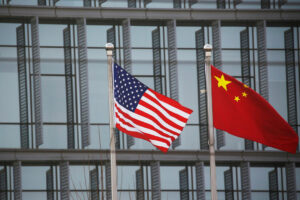THE “decoupling” of the US and Chinese economies could affect Philippine trade as manufacturers rely on demand from both countries, with China also being a key source of imports, according to Moody’s Analytics.
“(The) Asia-Pacific economies are sensitive to changes in the world’s top two economies. US-China decoupling and changing growth dynamics within China are key risks for the region, although some countries and industries are more exposed than others,” Moody’s Associate Economist Dave Chia and Senior Economist Stefan Angrick said in a report.
The US-China trade war began in 2018 after hundreds of billions of dollars worth of tariffs were imposed by the two economies.
The US and China were the Philippines’ top export markets in 2023, according to the Philippine Statistics Authority (PSA). Its total exports to the US were valued at $11.55 billion while exports to China were worth $10.93 billion.
China imports are crucial to key Philippine industries like minerals and metals, electronics, textiles, machinery, agriculture, chemicals, and vehicles, according to a Moody’s chart.
“China is a key supplier of inputs and an increasingly important market for many of the region’s manufacturers,” Moody’s said.
Philippine imports from China were valued at $29.39 billion last year, with electronic products at $5.71 billion, the PSA reported.
“Most of the region’s high- and mid-income economies, from Singapore to the Philippines, are particularly dependent on machinery and electronics imports from China,” Moody’s said.
Export markets of the Philippines, South Korea, Malaysia, Vietnam, and Taiwan heavily rely on Chinese demand for electronics.
“Electronics and machinery are highly vulnerable to geopolitical disruptions — particularly those that relate to semiconductors,” Moody’s said.
The US recently asked South Korea to restrict exports of chipmaking equipment to China. It has also called on Japan and the Netherlands to impose export restrictions on the Chinese market.
Meanwhile, Asia-Pacific exports of finished goods to the US would also be affected by the decoupling.
“Low-income economies such as Cambodia and Vietnam export textiles to the US, while Taiwan, South Korea, Japan, Malaysia, Thailand, Vietnam, and the Philippines send their electronics and machinery there,” according to the report.
The Philippines’ key exports to the US include electronics, machinery, agriculture, and textiles.
“Imports from the US are insignificant for most Asia-Pacific economies, especially when compared with imports from China,” it said.
Hansley A. Juliano, who teaches political science at the Ateneo de Manila, said the Philippine government must consider alternative partners to avoid disruptions to its market.
“It would be the responsibility of our economic managers to begin actively identifying which these alternative countries are, to what extent are we at risk of competition with fellow Asia-Pacific (especially the Association of Southeast Asian Nations or ASEAN) countries, and to what extent collaborative efforts are possible yet will still make the Philippine economy profit,” he said in a Messenger chat.
On the other hand, Mr. Juliano said the effects of the US-China decoupling on local industries are an opportunity to revisit its sustainability and environmental impacts.
“A number of these rely on mining, and a number of them produce pollutants that ruin Philippine natural resources,” he said.
“Should this be seen as an overall threat or also an opportunity to revisit which of our competitive advantages (say agriculture and dying manufacturing sectors) should be resurrected instead?” he added. — Beatriz Marie D. Cruz
